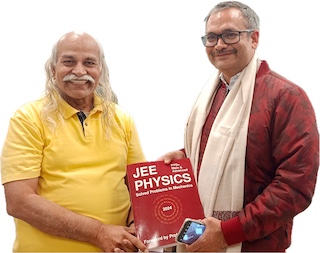Heating Effect of Current
A current i flowing through a resistor R generate a heat $H=i^2 Rt$ in time t. The potential difference across the resistor is $V=iR$. Substitute $i=V/R$ in the expression of heat to get \begin{align} H=i^2Rt=\frac{V^2 t}{R}. \end{align}
Thus, heat generated is proportional to time $t$. For a given current $i$, the heat generated is proportional to the resistance $R$. For a given voltage $V$, the heat generated is inversely proportional to the resistance $R$.
Problems from IIT JEE
Problem (IIT JEE 2010): When two identical batteries of internal resistance $1\;\Omega$ each are connected in series across a resistor $R$, the rate of heat produced in $R$ is $J_1$. When the same batteries are connected in parallel across $R$, the rate is $J_2$. If $J_1=2.25J_2$ then the value of $R$ (in $\Omega$) is,
Solution: Let $E$ be the emf and $r={1}\;{\Omega}$ be the internal resistance of each battery. The series and parallel combination of two batteries are shown in figure.
When two batteries are connected in series, effective emf becomes $2E$ and effective internal resistance is $2r$. Thus, current through $R$ is $i_1={2E}/{(2r+R)}$ and heat produced in $R$ is given by, \begin{align} & J_1=i_1^2R=\left(\frac{2E}{2r+R}\right)^{\!2} R. \nonumber \end{align} When batteries are connected in parallel, effective emf is $E$ and effective internal resistance is $r/2$. Thus, current through $R$ is $i_2={E}/{(r/2+R)}$ and heat produced in it is given by, \begin{align} &J_2=i_2^2R=\left(\frac{E}{r/2+R}\right)^{\!2} R. \nonumber \end{align} Substitute $J_1$ and $J_2$ in given relation, $J_1=2.25J_2$, and solve to get $R={4}\;{\Omega}$. Readers are encouraged to find effective emf and effective internal resistance for series and parallel combination by using Kirchhoff's law.
Related
- Thermo-electricity
- Electric Current
- Electric Cell
- Ohm's Law
- Series and Parallel Arrangements of Resistances
- Kirchhoff's Laws
Subscribe to our channel
